Turned out I had to try at least one more game, even after getting the science win date down to 176 turns.
So I've been relying so heavily on Jesuit Education for the speed runs. It's effective, but not all that interesting. That approach consumes five policies into Piety for no other purpose; all the policies before Reformation don't do anything besides throw more faith and discounts into the Jesuit plan. I wanted to try one more game without that.
Which merged with another game idea I'd had for a while. Instead of Jesuit Education or full Tradition, use Poland's extra policies for a grab-bag greatest-hits polymath approach from all the trees. The Patronage+Consulates part of my last game was solid, so keep that, but of course I want more.
The other two-deep dip I want is Tradition to Aristocracy. We always observe how all Tradition's power is in the finisher, but in fact there's a decent option with just two policies there. Aristocracy in particular is a gem I wish I could use more often. Each half of it could be worth a policy in itself; the happy aspect is worth 1/city like Meritocracy, and the wonder bonus is roughly comparable to Republic. What Aristocracy doesn't do is frontload, since the happy doesn't activate until size 10 and the wonder bonus only matters once there's a baseline of hammers to multiply. But it will be welcome in the midgame. So will the Tradition opener for border expansion, which is needed all the more, when all the maritime-frontloaded growth means the cities run out of workable tiles. Then we avoid the hollow interior of Tradition (Oligarchy is blank, Landed Elite is small, Legalism is merely okay) in favor of other options.
The rest of the plan comes from working backwards from one particular point later on. A non-Jesuit game will need to buy public schools with cash. Poland makes this precisely possible in a certain way: make sure the industrial-age freebie is Mercantilism to enable the discount right when we need it. There are 16 total policies available up to that point: 11 regularly earned, four Solidarity freebies, plus the Oracle. That makes the pregame playbook as follows:
| Policy number |
1 | 2 | 3 | 4 | Classical freebie |
5 | Medieval freebie |
6 | 7 | 8 | 9 | Renaissance freebie |
Oracle | 10 | 11 | Industrial freebie |
|
|---|---|---|---|---|---|---|---|---|---|---|---|---|---|---|---|---|---|
| Tree | Liberty | Patronage | Tradition | Meritocracy | Commerce | Rationalism | Mercantilism | ||||||||||
(There would be 9 regularly earned policies before the Renaissance rather than the usual 8, thanks to lots of culture from city-states. I had intended to leave Meritocracy to backfill later if necessary, but it turned out to come early.)
To recap the game settings for new or infrequent readers: Prince difficulty, Inland Sea map, huge size, hot climate for desert, young world age for hills, following Civfanatics Hall of Fame eligibility rules which means the standard counts of opponents (11) and city-states (24) and no wacky options like always peace or policy saving. (Disable Start Bias is okay.)
I used the same starting file from my previous game, loading it on turn zero and doing "restart map" to get a new game while keeping the same excellent list of city-states (nine maritime, six mercantile, five cultured.) I'm not sure if that's cheating by CFC HOF rules but I don't have to care. It's nothing you couldn't do with more manual restarting anyway. I did use a hex editor to change my leader's name in the file, so the save filenames wouldn't conflict with the previous run.
And for the first time ever, before the successful game, I had a failed start with El Dorado. Got the money, but missed Desert Folklore. It had been a poor map anyway, only one reachable luxury beyond the capital, and almost nothing from ruins.
Here we go for real.
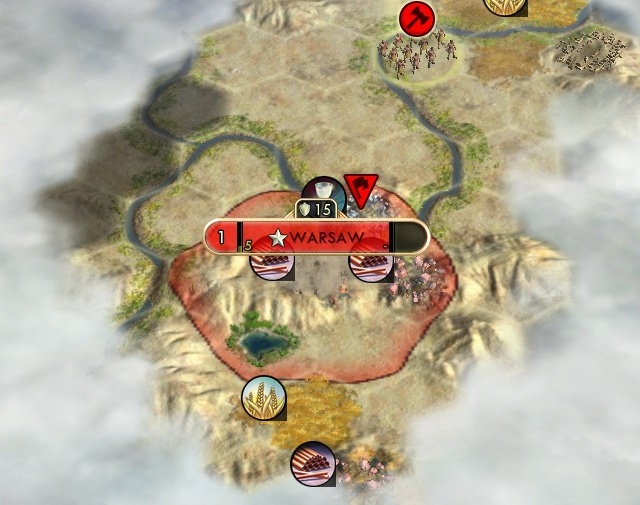
Oooooo. Nice.
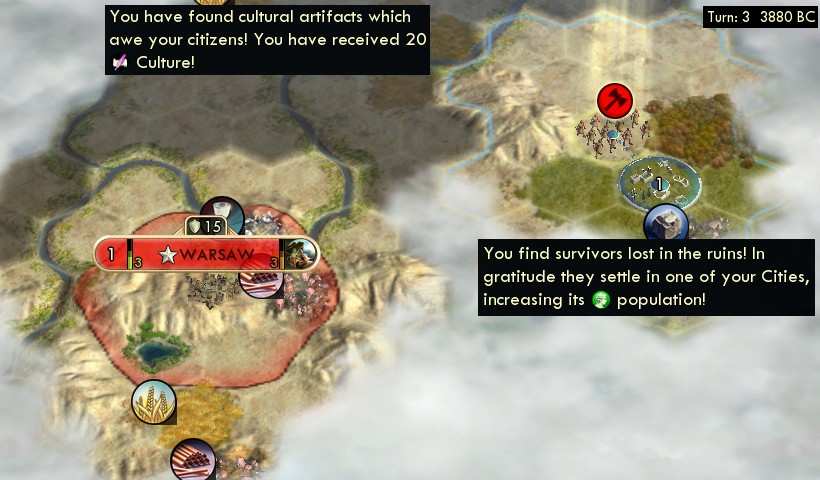
That very first ruin in the first picture gave culture, and another one just a turn later gave population. That's the twin jackpots of a good start and we're on our way.
I went on to get a lot of ruins. I was near the northwest corner with a sizable backyard to myself, and also it would turn out I had no neighboring civ for quite some distance to the east and a lot of vacant land. The ruins weren't all good (several maps and barbarians), but the sheer volume got me everything I needed and then some. I'll resist the urge to show them all, but here's the list: map, archer upgrade, t15 population to size 4, 90 gold, barbs, t20 second culture, t20 population to 5!, 90 gold again, barbs, map, 80g, another archer upgrade, t25 third culture, map, Pottery, t28 fourth culture ruin!, t31 big faith towards the prophet, t58 a late map way in the far corner.
 Missing from that list is faith for the pantheon. I was starting to get really nervous that such a great start might be wasted by missing Desert Folklore... and then got the pantheon the old-fashioned cheaty way by finding two religious city-states.
Missing from that list is faith for the pantheon. I was starting to get really nervous that such a great start might be wasted by missing Desert Folklore... and then got the pantheon the old-fashioned cheaty way by finding two religious city-states.
Build order: 3 scouts to explore - monument - scout to go worker stealing - archer - archer - settlers.
I bought the wheat tile with my first 50 gold (it's on plains not desert), to save a turn both on the second scout and on growth. I then got up enough money to still buy a worker nicely fast on turn 18.
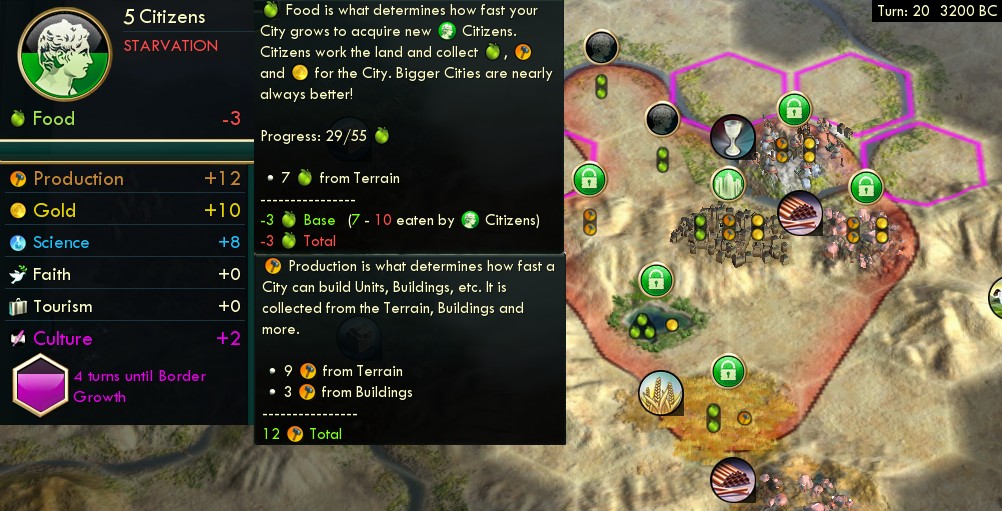
Turn 20 came the first interesting decision. Warsaw had grown to sizes 2, 4, and just now 5 by survivors from ruins. I had worked max food the whole time anticipating another normal growth eventually. But then at size 5, I changed my mind. Here's a situation I'm always prepared for but uncommonly comes up. Instead of growing from here, I decided to burn the stored food into hammers by working at a deficit. Because the city could only get to +1 food surplus anyway (with only four food tiles to work) and so that potential growth would take quite a number of turns. But burning that 29 stored food would instead get me ahead by 29 hammers. This case is truly 1:1 in converting food into hammers, not the 3:2 ratio that arises when you have a lot of 3-food tiles and have to swap off one of them to a 2-hammer hill.
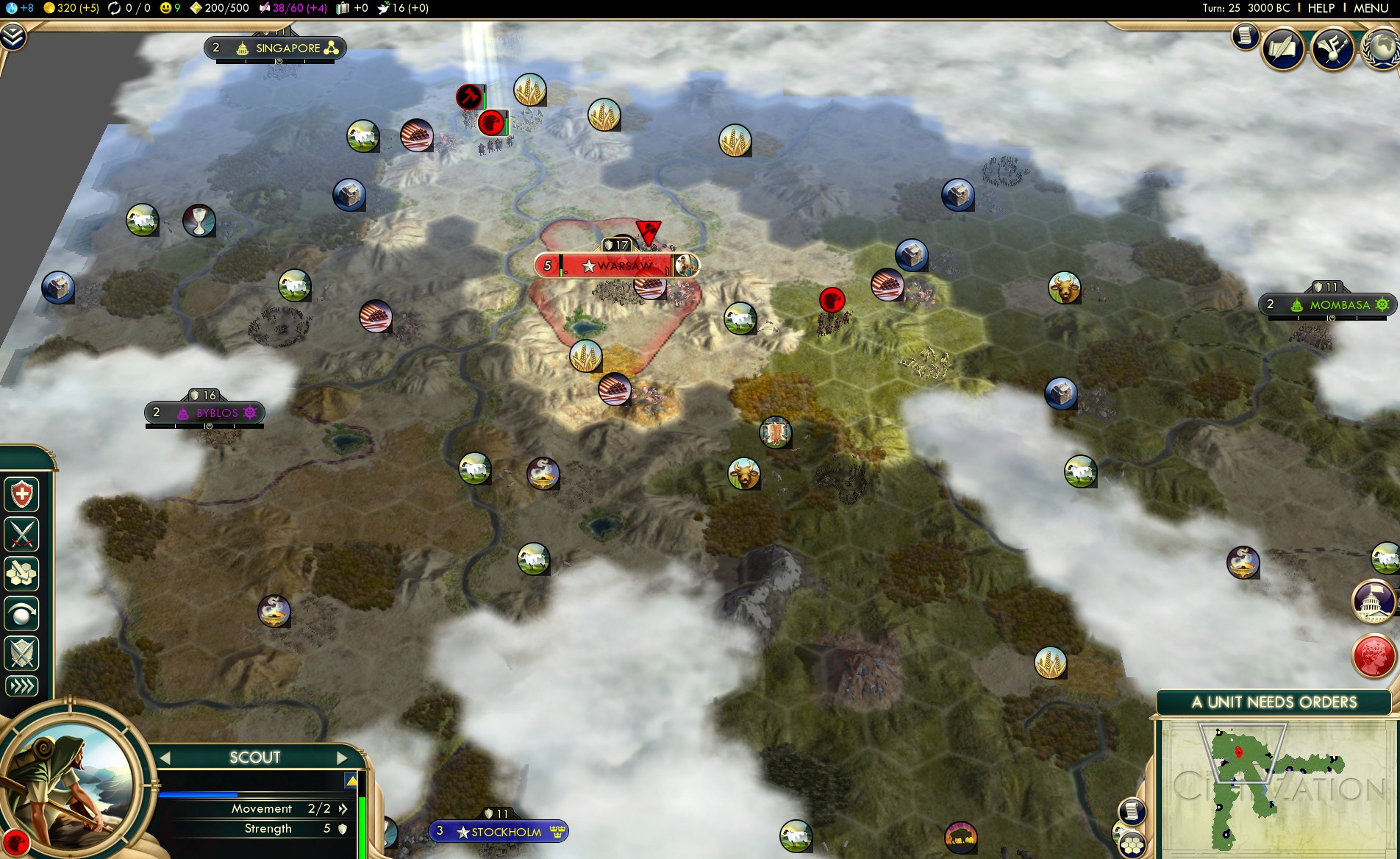
Here's an overview of my neighborhood. Nice amount of desert and a nice backyard to expand into. But what turned out very well on this map was the location of city-states. On the mini-map, see how many of them are clustered on the north shore of the inland sea. Thanks to all of them and two gold ruins and the copper at my capital, I racked up enough gold for a second worker purchase amazingly early on turn 25. That makes up for getting zero worker buys last game! And that dense shoreline of city-states meant it would be easy to reach and clear camps for them, more in a bit.
The two ruins visible in that picture yielded Pottery and my third culture boost. That brought me to Collective Rule very early on turn 26. Warsaw completed its current archer plus one more, then settlers.
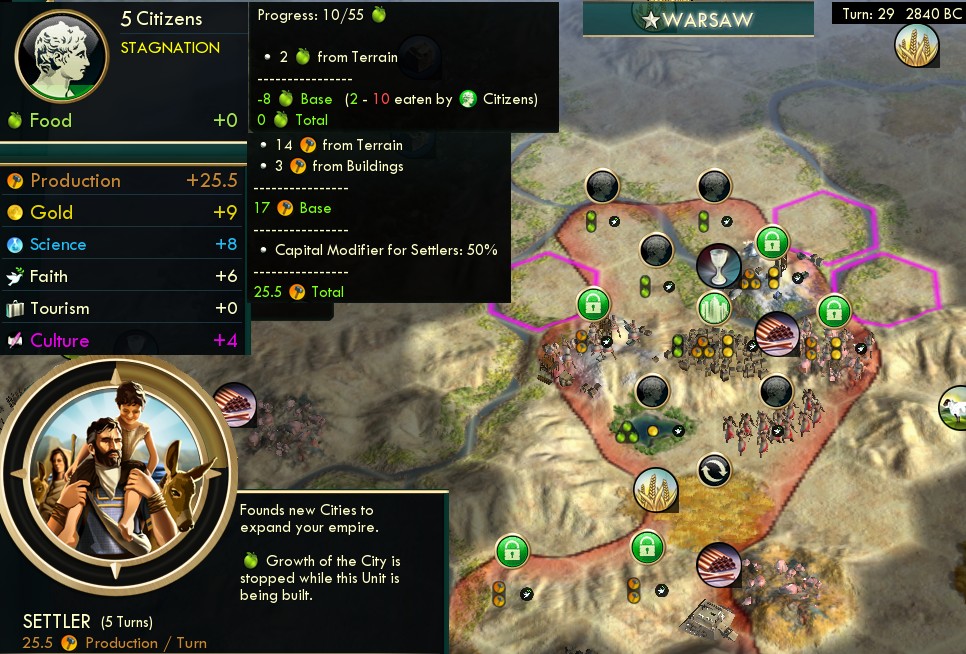
I was able to start building settlers on the starvation plan fantastically early, on turn 29. Roughly turn 37 for this is common; I've already gained eight turns over some benchmarks. Several things have to happen for this to come together, and they all did here. You need three culture ruins, check. You need 5 population, to be at the sweet-spot threshold where more growth won't pay back hammers quickly enough, and I got three from ruins so only had to grow normally once. You need two workers to mine the hills, check, both purchased. And you need two military units, one to cover workers and one to escort settlers. I got those two archers built so fast thanks to skipping a worker build entirely (after buying two), and by burning stored food into more hammers after growing to size 5 mostly on survivor ruins.
This is literally just about as fast as is physically possible to get to this state. The uber-frontloady Shoshone actually can't do this. Because their pathfinders are too expensive; three of them cost 60 more hammers over three regular scouts. This start could be matched with enough luck by any other civ (Poland's UA hasn't done anything yet), but none has any way to cause it to happen other than rerolling and retrying.

Also making that possible was the city from the Collective Rule settler. My favorite trick is to position this settler to claim two desert hills within the capital's reach for starvation settlers (and later Petra), and also to borrow the capital's food tiles while it's building settlers. This requires a certain specific layout, with the two hills adjacent to each other in the capital's third ring of tiles, and the food resources within the area of overlap. This layout isn't always possible, but it came together perfectly here. Krakow had to give up river access to be in the right spot for this, but that is okay. We can live without a watermill, and city #2 uniquely gets a special status to not need a Garden, because it comes first in turn order to spawn the first Great Scientist at 100 GPP before any city does any garden. Also Krakow grabs a new luxury in its first ring too, perfect.
Krakow is building the Pyramids right from its first turn, which I've found to be the best plan to get that wonder. Food and hammer resource tiles are the key for ramping up productivity into the Pyramids. Krakow would use Warsaw's wheat and oasis, its own sheep, and also a horse tile soon to be revealed, for great productivity into the Pyramids.

I deliberately brought that first starvation settler just barely short of completion. I counted out all the hammers (including a worker completing a mine) exactly from even before this settler was started, calibrating it by how much overflow I took from the archer before it. This was to use the trick I mentioned in the previous report: complete one more archer all in one turn thanks to 27 hammers of overflow, thereby sneaking a turn's worth of the +50% Collective Rule bonus onto the archer too. It does chafe to delay the settler pipeline for a third archer, but I've found that this unit really is important to ensure that all the settlers get smoothly escorted against barbarians. I later did this one more time for one more archer too.
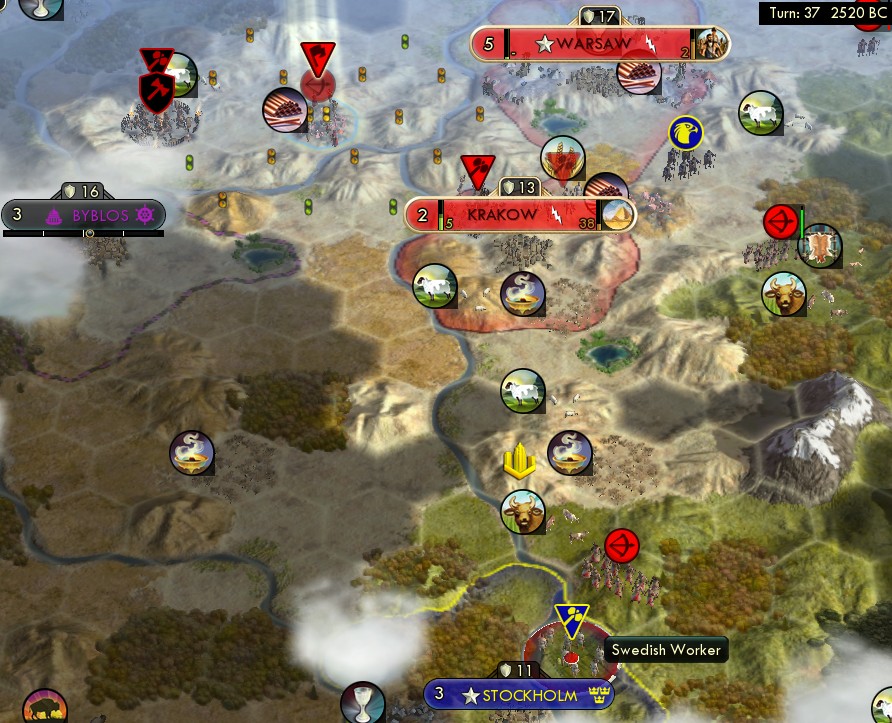
Like that. That third archer turned out to be mandatory to escort that settler near Byblos where I wanted that city (two tiles away from the barb camp, which would get the settler stolen if unescorted) and then to clear the camp. I knew the worker was Byblos's, but decided it would have more value in my own hands rather than returning it. A maritime friendship-but-not-alliance (food only in the capital) doesn't help during starvation settlers, and there will be plenty of opportunity to work on Byblos later once Patronage ramps up.
And to the south, I'm stealing a worker from Sweden. Hurts a little bit that my target has to be Gustavus, giving up any chance of the +10% GPP from friendship with him later, but so be it.
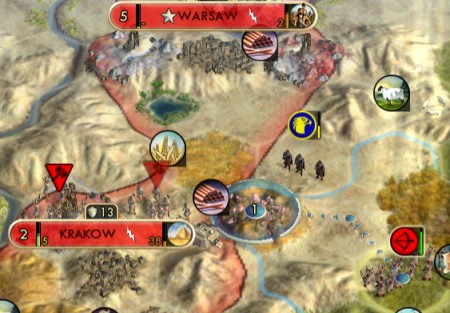 Tactical note: beware of that Swedish scout, in range to steal my worker. Warsaw plus the archer couldn't quite kill it this turn. Solution: my archer has to move onto the copper tile, to zoc-block the scout from reaching my worker.
Tactical note: beware of that Swedish scout, in range to steal my worker. Warsaw plus the archer couldn't quite kill it this turn. Solution: my archer has to move onto the copper tile, to zoc-block the scout from reaching my worker.
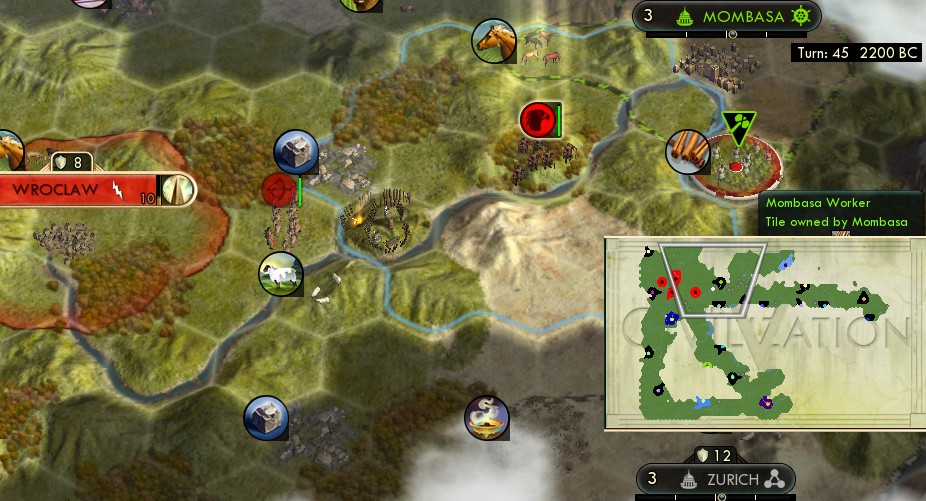
And a classic worker steal. Again I hated to pick on a maritime, but it was the only available worker nearby; Zurich hadn't turned up with one. And it's in the right place to put to work quickly at Wroclaw.
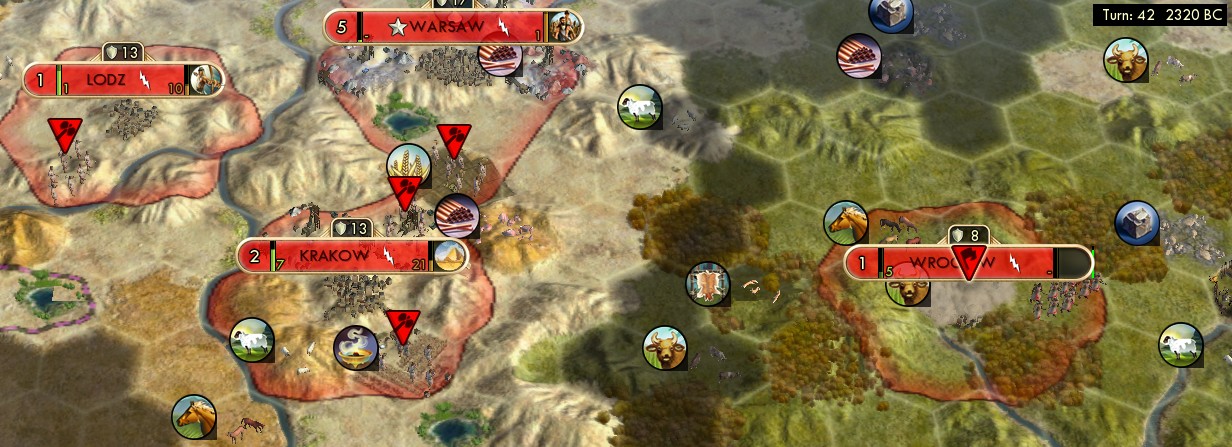
Four cities in 42 turns is a record. (Barring a Spain or El Dorado luckfest.) I was proud of myself for picking the right location for this area for Wroclaw. It's founded on a cow, which is actually not wasteful, because it's grassland so the third food works on the city tile and is even better than a hill hammer. This was the spot to get the city on the river and have to buy only one of the horse or fur tiles.
(Although this goes to illustrate my sense of land quality that's been rather warped in Civ 5. Wroclaw should be considered a beautifully lush location with all that green grassland and a bunch of resources. Instead, a location that won't play into Desert Folklore strikes me as merely adequate.)
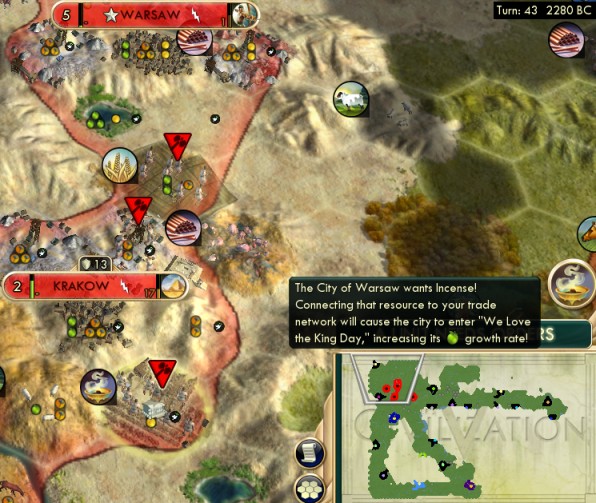
Warsaw demanded Incense for We Love The King Day just as I was already improving it at Krakow. So I alertly stopped improving it! King Day would be wasted while stagnating for settlers then Petra; better was to delay it as long as I could manage without the happy, until it would multiply granary and maritime and Petra food.
Policies: t6 Liberty, t20 Republic, t26 Collective Rule, t45 Citizenship. Then into Patronage, with the opener coming on turn 59 by Poland's classical freebie, and Consulates on t65.
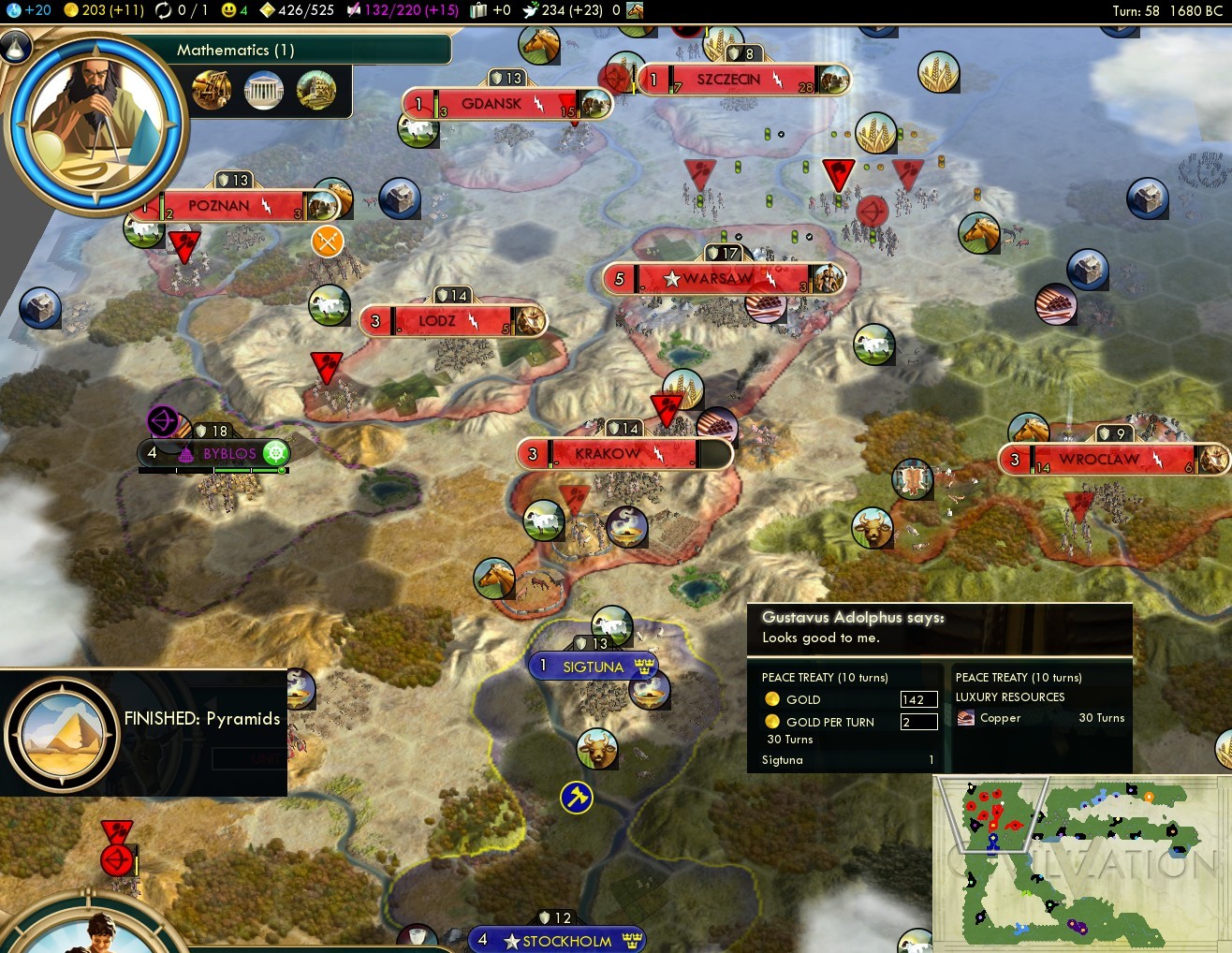
Here's an intermediate overview with a lot going on. Pyramids done in record time, even faster than the previous game where that city got a survivors ruin. Just cleared a camp for Byblos in the southwest, capturing a worker (formerly a Swedish settler.) Chariot archers being produced in Lodz and Wroclaw to go clear more camps. Out to seven cities in 58 turns, with the several archers smoothly escorting them with no delays. Plus a settler on the move, and one more city to come by peace concession now.
Sweden just settled Sigtuna there. I didn't expect this so soon after I saw the previous Swedish settler get captured by barbs. But I did correctly expect that as soon as Sweden did settle a city, they would cede it to me for peace. Sigtuna wasn't a great location crammed in there so tightly with few tiles to itself, but the tiles it does have are all good and I decided it was good enough to take for free. Plus I have that captured worker there nearby to improve it and an archer to defend it. With Mathematics coming on the turn roll, I annexed Sigtuna and started building its courthouse right away.
Also I was able to take advantage of the peace treaty to sell Sweden a spare resource for money, also important.
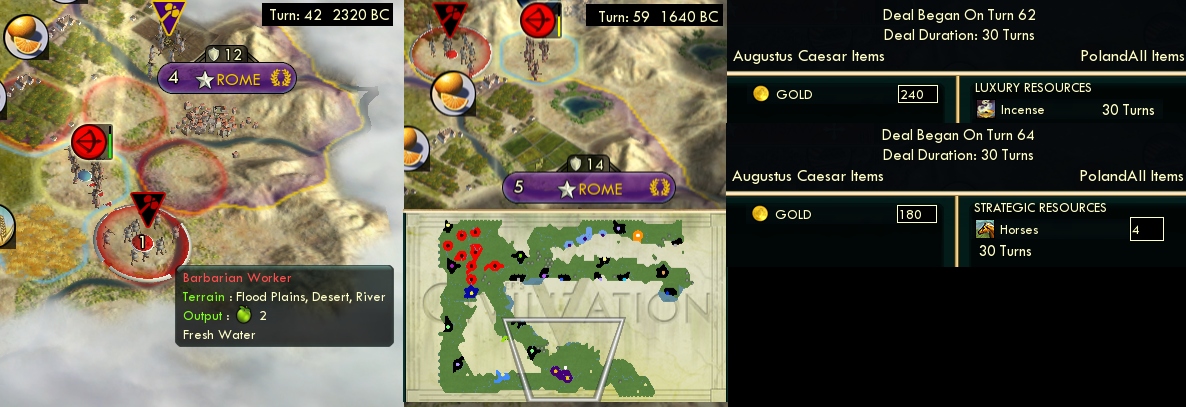
On top of Sweden's money, I got a huge pile from Rome. My exploring archer had found two loose workers that could be returned, for which Rome rewarded me with a friendship agreement, and paid me a fortune for a luxury and horses. What should I buy with this money and Sweden's spoils? I had enough workers, 9 now and expected that a few more recaptures always come. A Patronage game wants to buy city-states, but it would still be some time before Consulates ramped up and the money shouldn't sit idle until then. So the most immediately frontloaded time-valuey items to buy were a caravan unit to send food to Warsaw, and also its watermill. That was a nice snowball boost I haven't had before, to have those operating and Warsaw growing at a fast pace (multiplied by King Day) even before Petra.
The settler currently in production in the previous picture would be Warsaw's last, would be my 10th city and didn't have happiness to support more. Currency for Petra was still several turns away. Warsaw had an unusual gap in its build queue here, especially after I bought the caravan and watermill.

So I went for, and landed, the Great Library! I was able to check before starting the wonder that no known civ was constructing it. Only a few had Writing, and an embassy with each showed no wonder under construction at their capitals. I still hadn't met two civs, so still was gambling, but it paid off. I haven't gotten to use the GL much recently; even on Prince it's still common for an AI to start it by turn 40 and finish by 60. It just doesn't fit, with the capital doing settlers, city #2 doing the more-important Pyramids, and city #3 getting started too late to expect to land the wonder. But I got it here. Couldn't risk pushing it all the way to Civil Service (another 15 turns), but Currency is still a fine prize and would immediately enable Petra of course.
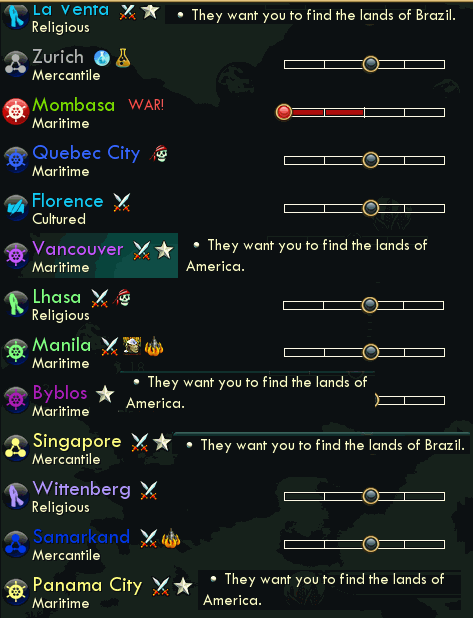
Every good game involves some luck with city-state quests, but this is about as easy-mode as it can get. Five find-a-civ quests, which are trivially easy by buying an embassy once you get to Writing tech.
And with that, let's move on to the camp-clearing portion of our program. Even with all the other good stuff going on, this was still a Patronage game. I had settled and improved horses early (this doesn't always happen; horses don't appear in desert) and built two chariot archers right after researching The Wheel. Here we go.
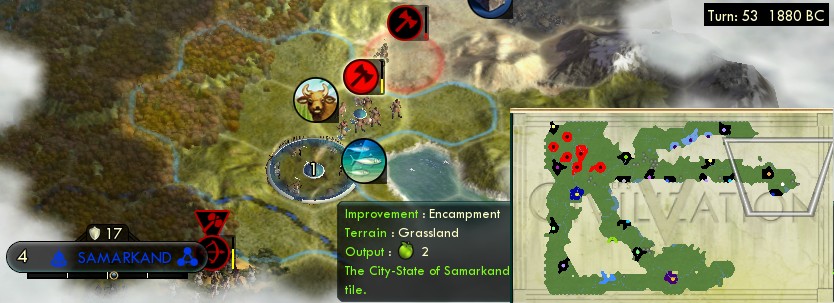
My first exploring warrior had this stroke of luck handed to him, as easy as it gets. That barbarian archer vacated its camp to steal a worker. I can clear the camp uncontested, and then between turns Samarkand will shoot the archer, and I can recapture and return the worker too. +6 happy so early from this mercantile would go a long way towards expanding. It also let me delay the incense hookup for Warsaw's King Day a bit longer.
I called this a stroke of luck, but there's an element of design that goes into it. This sort of thing happens much more frequently on the shores of the inland sea than elsewhere. Camps are concentrated closer to the city-states here than on the outer edges. I've learned to always keep that first exploring warrior on the inner track around the shore to take advantage of these setups. Also, where city-states are clustered near the shore and the sea blocks off one direction, you get more situations where multiple city-states overlap quests on one camp.
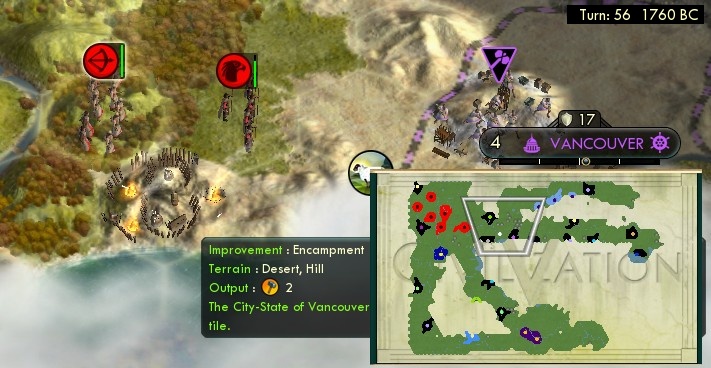
One archer had sallied from home even ahead of the chariot archers, to get here and pick up a camp clear to start rolling with maritime food nice and early. Vancouver had a second easy quest in the queue (find America) to top off the friendship into alliance.

Archers also cleared two camps near home. Singapore went directly into alliance (another 6 happy) with the returned worker, and maritime Byblos also came into alliance with a find-a-civ quest.
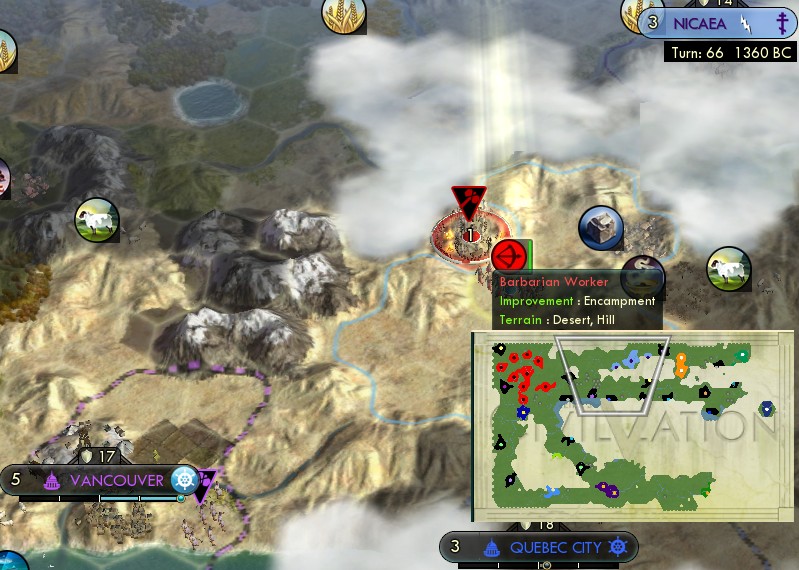
This one wasn't a quest, but my passing archer took the time anyway to clear it and capture that worker. I just saw it spawn a unit that walked off towards Byzantium, so I knew my archer had several turns of safety and wouldn't have to shoot down a second unit. I hoped the worker belonged to Vancouver or Quebec to return for maritime influence. Figured that if it was Byzantium's, I could keep it. It actually turned out to belong to Wittenberg, a religious city-state some distance away. A religious CS with a duplicate luxury isn't important to befriend, so I did keep this worker and brought it home to use.
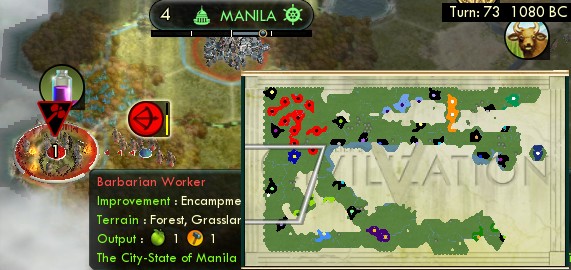
Easy peasy third maritime ally. Notice the influence meter is already up some from Consulates.
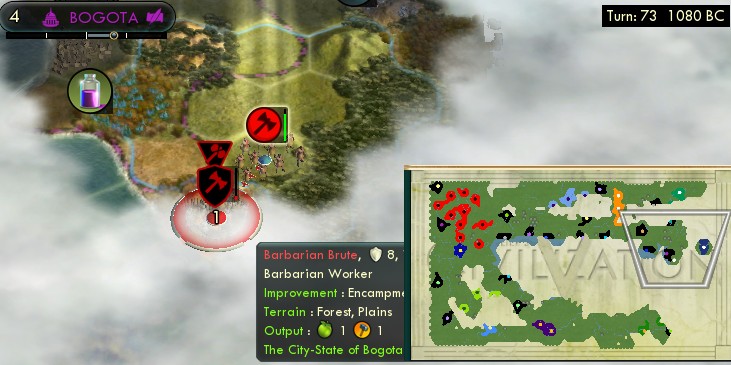
This one took some alertness. I didn't do that damage to the defender. I saw a "-30" number pop up on it between turns. Somebody was attacking it from the other side. I made sure not to attack it myself until it was within range to kill on my single hit. So I got my first cultured ally here, including returning the worker.
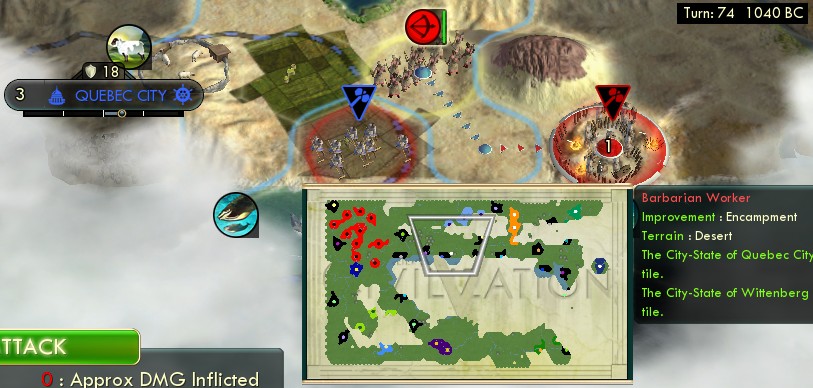
Continuing on that lucrative north shore, here's my first two-for-one. One was unimportant religious Wittenberg, but the worker did belong to Quebec for maritime ally #4.
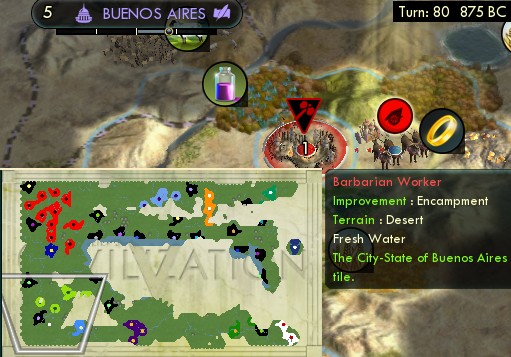
My southbound chariot archer finally overtook the regular archer in this direction.
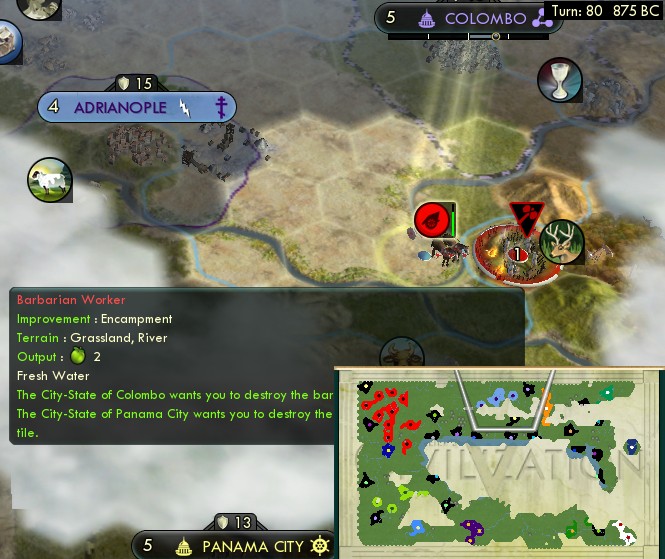
Same for my chariot in the north. The worker belonged to Panama City. Five, five maritime allies, ah hah hah!
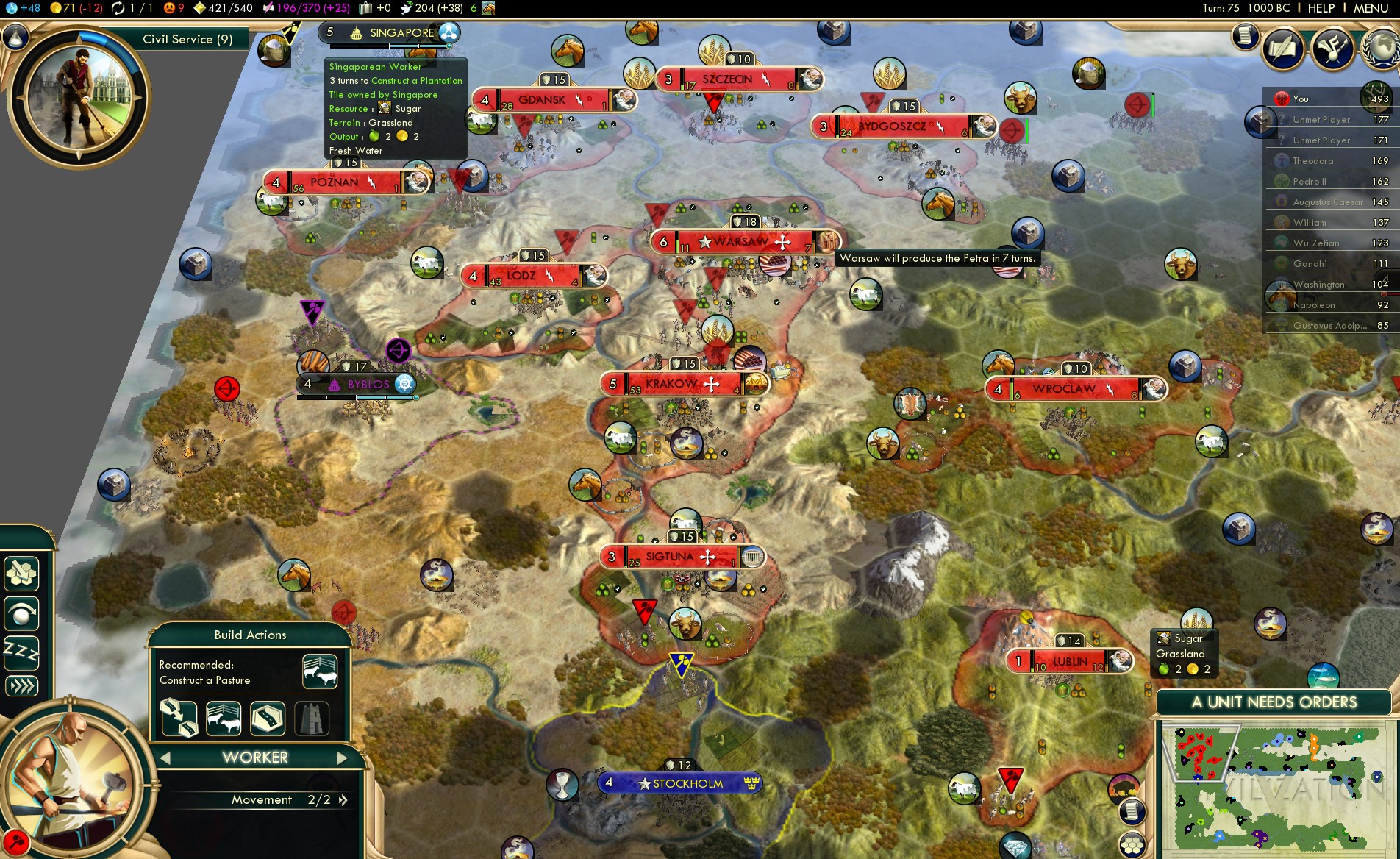
What did I get out of all that snowballing? 37 population at 1000 BC, just 2 below my highest. And 48 beakers sets my new highest record, thanks to two libraries plus the Great one. And the GL has directly jumped me ahead by about seven turns of research as well.
What's wrong in this picture? -9 unhappiness, ouch! That was intentionally done by my own hand. The previous turn, I brought each city up to a full food box using the Avoid Growth option, and then unclicked that to let them all grow at the same time and spill over past the threshold. Plus I settled Lublin on this same turn. As always, if you're going to be over the happy cap, you may as well be drastically over, so all the surplus citizens can exist to be working tiles.
But there's also a lot of work going on to fix the state of happiness. Some of that work isn't even mine: notice Singapore up there busily improving its sugar for me. I'm about to improve my own gems at Lublin. Sigtuna is about to finish its courthouse and Krakow is contributing a circus. And I just got to 200 faith for the first pagoda. I rapidly fixed this situation in just two more turns, once Singapore finished with its sugar.
With the Great Library jumping to Currency, and lots of workers early to build farms, I decided Civil Service was a higher priority before Engineering this time. But then Engineering came next before Education. Without the Jesuit Education plan, without shrines and temples, the cities' build queues cleared up earlier than usual. After granary - library - monument - watermill, they needed a good item to build, which would be aqueducts. I've converged on the opinion that it's OK to delay aqueducts as long as you're building other growthy things like watermills, but you really do need those aqueducts before universities or else you stall out badly on growth once you're working scientists.
Libraries were second in that build order, and everywhere in the picture. I keep telling myself in every game that I need to build libraries sooner, but they just keep getting crowded out and pushed back by everything else. Often they don't even complete until just before Education. This time I finally held fast to that intention, also motivated by getting the National College up soon with the Aristocracy bonus. (I've let the NC get delayed all the way to the industrial era before, when it gets crowded out by too many other wonders. Gotta stop that.)
Late-founded Lublin took care to do its library first before anything else. It would get the Petra caravan for food support.
Religion: Standard sequence, settle the first prophet (on Wroclaw's horses to connect them), found the religion with the second prophet, buy one missionary to start spreading conversion pressure, then pagodas. Actually I overbought pagodas for a while when I didn't immediately need the happy, could have enhanced sooner, eventually did on turn 102.
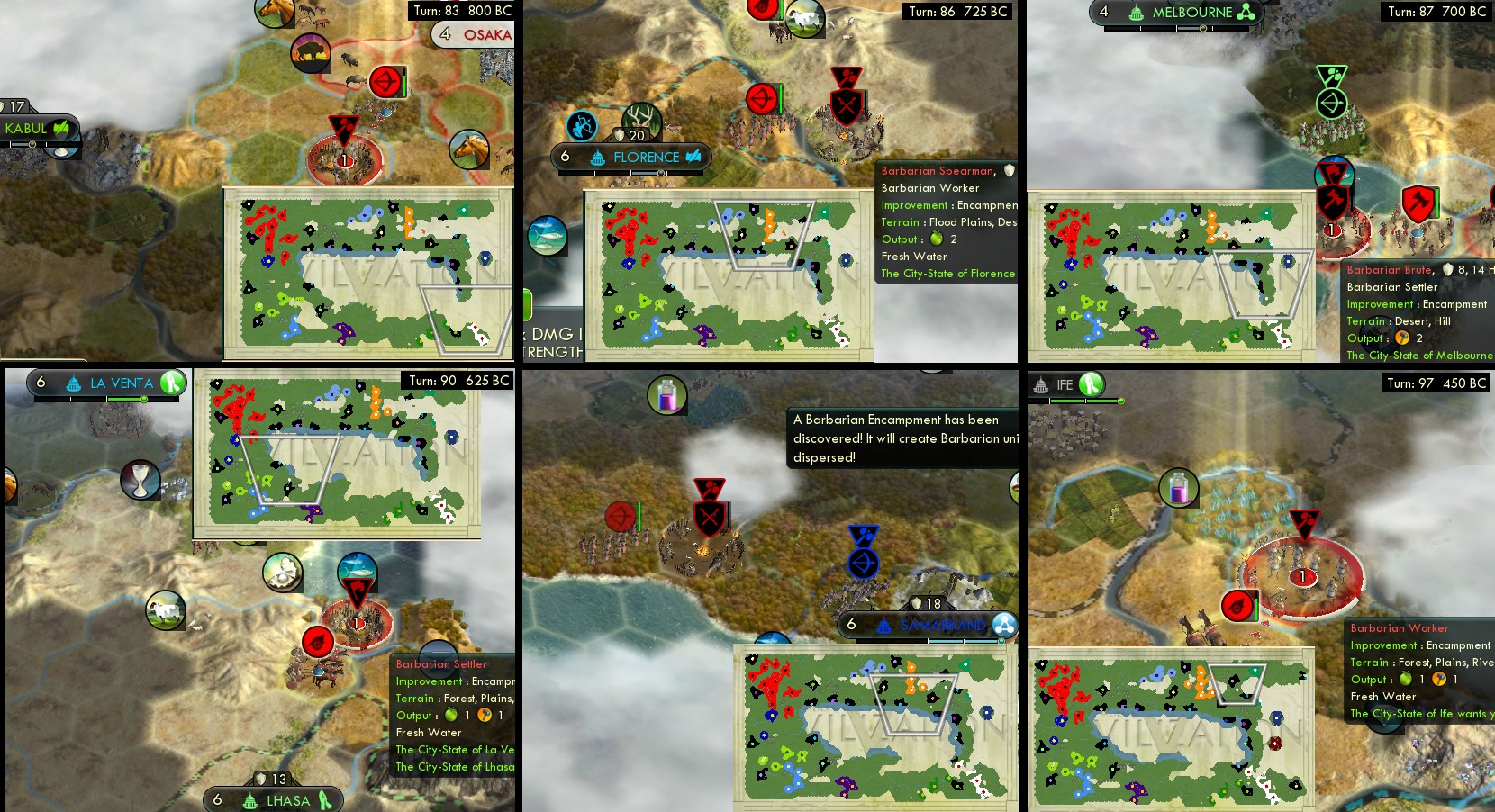
More camps, which I'll condense into a montage to speed things up here. #1 wasn't a quest, but I had just seen that worker get captured from Kabul so knew I could return it. #2 and #3 were routine. #4 was two religious city-states, not as important as maritime or cultured, but we'll still take it. #5 was stupid easy, I just walked up and discovered the camp as Samarkand already just about shot it down with its own archer.
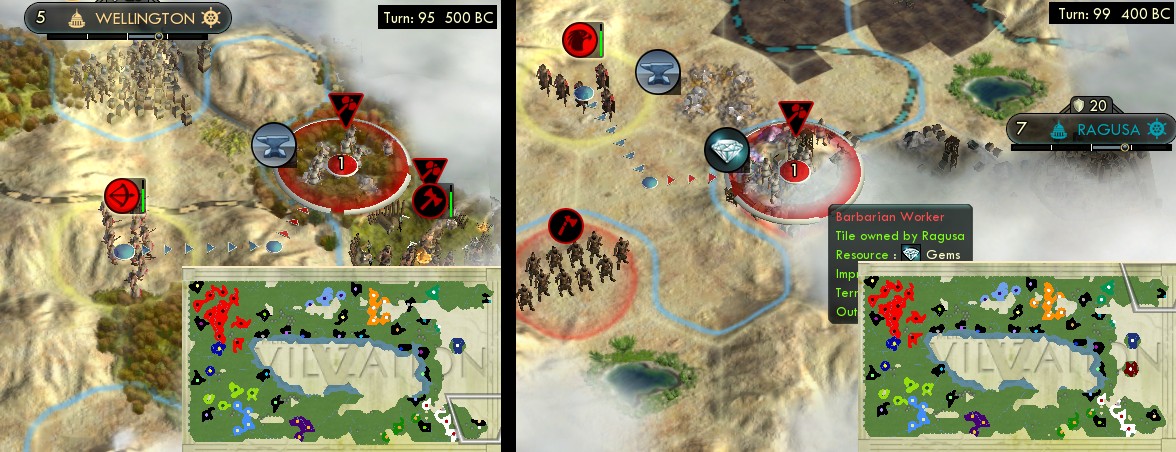
And finally these two. The one ever so slight hitch in all this was being late to find and contact these last two maritime city-states, in the farthest corners from me. But as soon as I did get there, there were workers and camps easily available, making my 7th and 8th maritime allies.
This is the single biggest difference between Emperor and Prince difficulties, which I never anticipated until seeing it play out. Prince difficulty allows you to clear a lot of camps and recapture a ton of workers. Because the AI civs have fewer units to do it themselves, but also because the city-states don't get the high-difficulty modifiers and freebies either. On Emperor the city-states get more units to defend and retrieve their own workers, but on Prince stay nakedly vulnerable for a hundred turns.

I claimed a bunch of desert hills with a Great General that I got from all that fighting. I think I finally realized how this works. You get Great General points against barbarians from ranged combat but not melee combat. I have no idea what sense that is supposed to make. But that accounts for the variability in whether and when I get this GG, depends on whether the units doing the fighting happen to be melee (particularly Shoshone pathfinders) or archers.

And this sequence of silly easy miracles happened. Warsaw was demanding Cocoa for its second round of King Day and there were no sources in sight anywhwere on the map. I despaired of ever satisfying that. But then I contacted the last remaining civ of England, who miraculously had a cocoa resource available for trade right then. (King Day in the capital is huge, can add up to 200 food and two city sizes over the 20 turns.) And on top of that, two city-states issued quests to find England right away and then two more too before I eventually completed them all with an embassy to get a ridiculous total of city-state influence for free.

I didn't buy any city-states from scratch, but did pay to refresh a couple maritimes. With another stroke of stupid easy luck here, Byblos issued an investor quest (+50% influence from giving money) just as its alliance was about to run down.

In the policy department, I completed my plan with the Tradition opener on turn 82 and Aristocracy on t83 with the medieval-era freebie. But now I had a lot of culture coming in, thanks to three city-states allied from those camp clears. More from them than from my own actual civ! I could see this would all add up to one more policy than I had originally planned. So I could fit in Meritocracy after all. That came on t89, followed by the Commerce opener on t96 and Landsknechts on t103, marking time up towards Mercantilism before Rationalism unlocks.
And another helpful reason to be in Tradition was to get the Hanging Gardens. I toyed with building it in a side city since the food would be rather overkill in the capital, but the capital could do it in about 7 turns and a side city would take 20+ and delay its aqueduct and university, so the capital got it after all. Also, one perk of skipping Jesuit Education was skipping the Hagia Sophia, no need for that extra prophet.
Tech: I reached Civil Service on turn 83. That's my record speed for any non-Babylon game, mostly thanks to the Great Library. I then came to Engineering on t88 and Education on t100. The aqueduct builds fit perfectly in that time span right before starting universities.

Here's what all that added up to for Warsaw: 67 surplus food still deep into BC years, growing at a phenomenal rate, and getting the National College up at a good time.
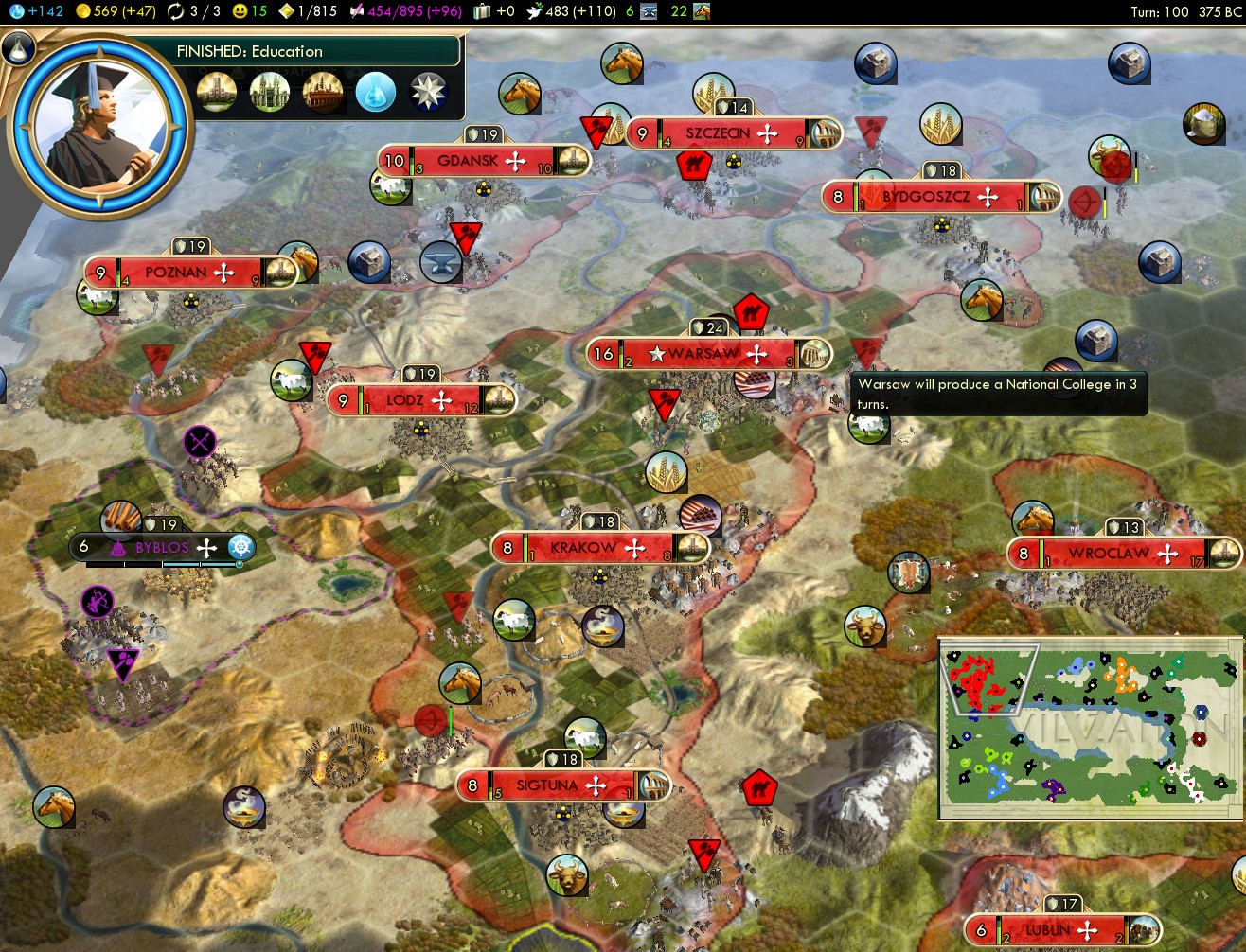
Education on turn 100 matches my record in one of the Babylon games, but that game didn't have Engineering yet and this one did. My previous best times to both Engineering and Education were t103 with luckfest Spain, 106 with El Dorado Babylon, and 107 under normal conditions in a previous Poland game. So this is now my stone cold speed record in any game by any means bar none.
So much snowballing from the maritime city-states and fast Civil Service. Maybe Jesuit Education isn't so necessary after all. The Jesuit games generally finished faith-buying the universities around turn 110... and this game would just finish building them normally at that same time.

Presently I enhanced the religion for Religious Community perfectly timed to help build the universities as well. (This had been a minor mistake, I could have taken this earlier instead of some of the pagodas, had enough happy without them.)
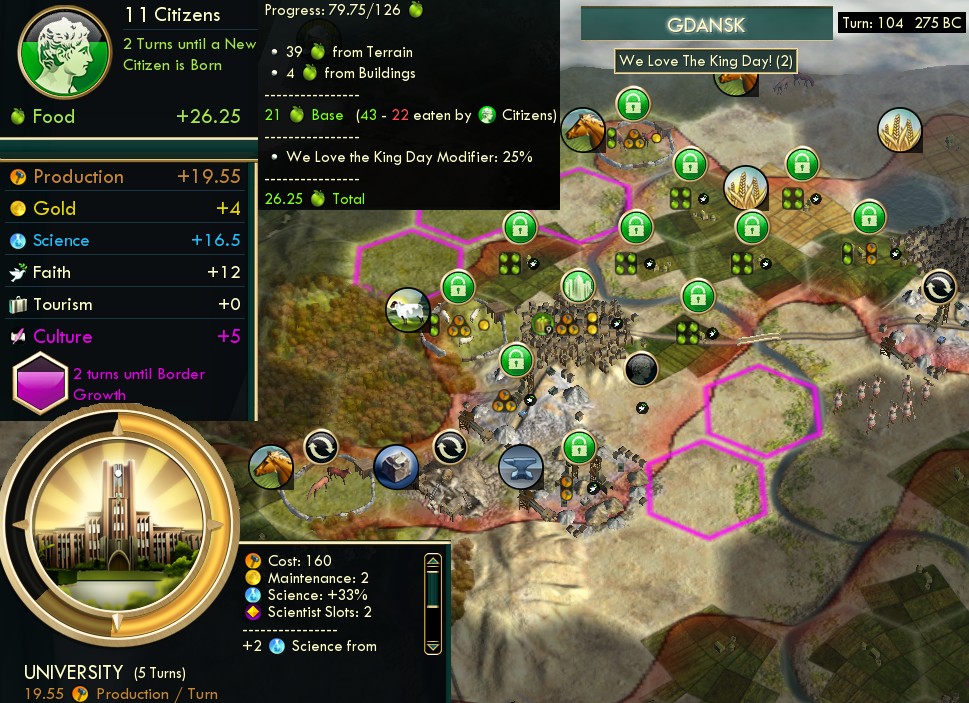
Here's what a typical city looked like. Lots of food tiles plus the maritimes all multiplied by the aqueduct and King Day. Already up to size 12 in BC years; in many games for many cities that's an endgame size.
Figuring importantly was the Tradition opener. Without it, all of these cities wouldn't have enough tiles for the population to work. All cities get 5 culture production from Liberty, monument, pagoda, and there's no good way to go any higher. The Tradition opener reduces the culture cost by half once you're past the first few tiles, and thus doubles the speed of acquisition. Each city's 5th tile costs 70 culture without Tradition or just 35 with it. This turned out to just about perfectly match city growth and worker improvements across the board everywhere; time and time again I had cities on the verge of having no workable tile but then the border popped just as it grew.
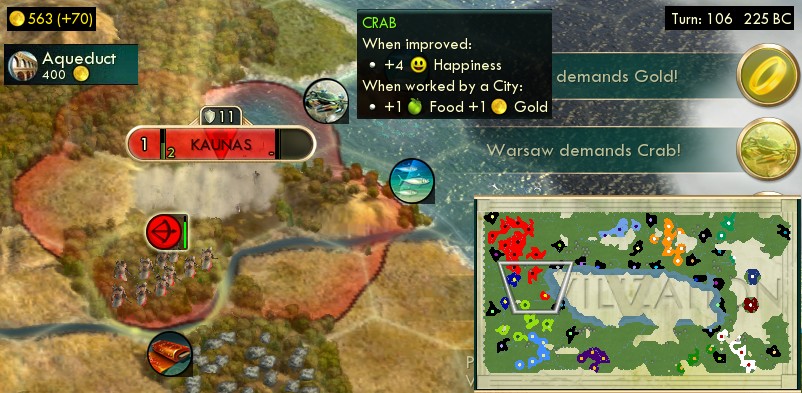
I expanded to 10 cities early, then decided there was enough happy headroom to go for one more once the National College was done. This is how to bootstrap a city quickly. It's already growing in just two turns from the maritime food, and on top of that I also sent a food caravan and bought its aqueduct. There's also a barbarian camp just to the south that would supply me a worker to improve it. It claims two new luxuries -- complete with another stroke of luck that Warsaw just picked exactly that resource for its next King Day demand.
The money to buy this settler and aqueduct had come from connecting roads quickly, thanks to the Citizenship fast workers as always. Also the happiness Golden Age.
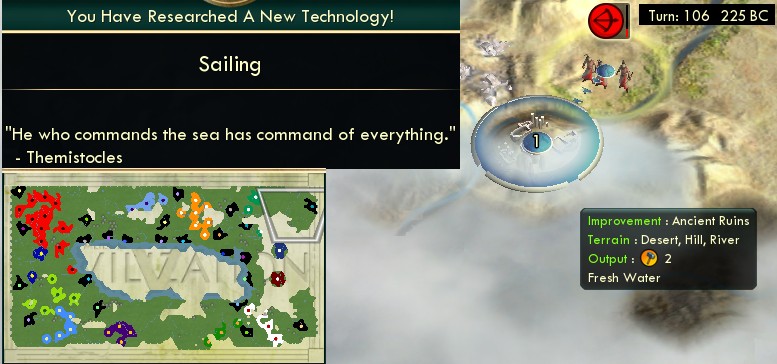
As usual, I found a few late ancient ruins in a far corner. Got an archer upgrade to this unit, a map, culture, and notably Sailing here.
Time for the landmark 1 AD overview.
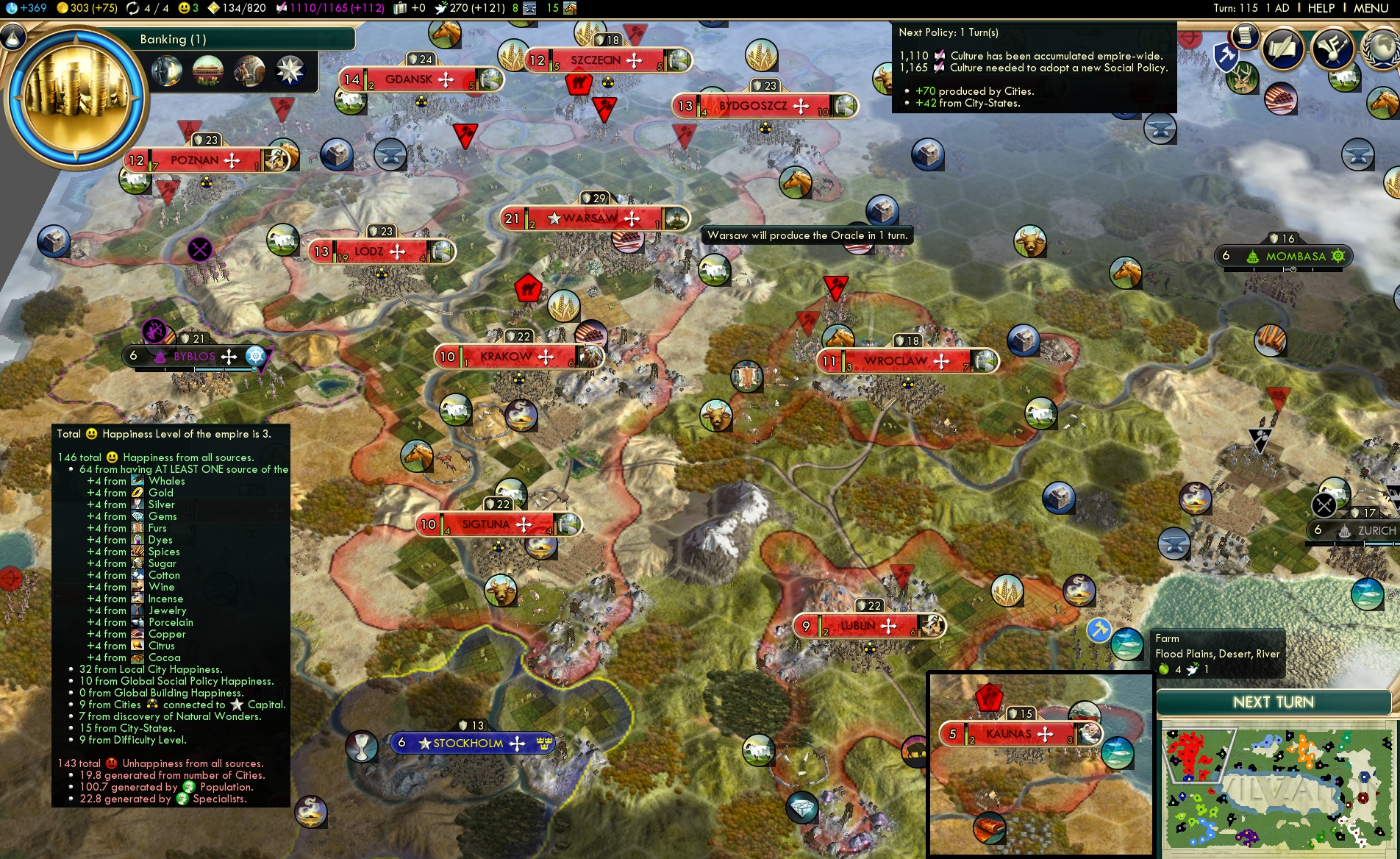
HOLY CRAP. That is 130 population at this date, which SHATTERS my previous record of 104! Beaker production of 369 is also tops by a long shot, over a wide Shoshone game at 305. Hot damn. This is the magnum opus game I've been trying to deliver. Wow. These cities are like twenty turns ahead on the growth curve compared to my previous bests.
How much of this is due to skipping the Piety tree? A lot, but it's not the growth, it's the happiness. Compared to my last game with Patronage and Piety, the five Piety policies up to Reformation were reassigned instead into Tradition, Aristocracy, Meritocracy, Commerce, and Landsknechts. The last two don't do anything yet, and none of them help with food growth... but Meritocracy and Aristocracy total to 25 happiness and that accounts for all of the population differential.
Where skipping Piety did help with growth was in the cities' build queues. Without doing the shrines and temples, the cities completed libraries much sooner, turn 80 before aqueducts rather than turn 100 after them. And then they proceeded noticeably faster and smoother up the curve of watermill - aqueduct - university - garden - workshop - market - bank. The capital did miss the Piety shrine-rebuild trick to steal some extra hammers, but Aristocracy on all the wonders more than made up for that. And the Religious Community belief also helped for production rather than using that belief slot for Religious Center happy.
So both growth and happiness went spectacularly well. I had bubbled up as high as +26 happy for a little while, which triggered the happy Golden Age nicely timed to build the aqueducts. The display there shows where the happy is coming from, some of everything: many luxuries of my own and from city-states and from AI imports, mercantile CS, circuses and pagodas (local city happiness), both Meritocracy and Aristocracy. It's temporarily tight right now down to just +3 happy, but that's because the luxuries at that newest city Kaunas aren't hooked up yet, plus we're about to get Notre Dame then the Forbidden Palace.
I'm lined up with the next policy and Oracle set to complete on the same turn as Renaissance entry, plus Poland's freebie, taking all of the Rationalism opener and Secularism and even Humanism on turn 116. That is two turns ahead of my previous fastest, but I'm actually doing much better than even that. The other game sprinted early to the Renaissance via Acoustics, while this one has already backfilled almost all the medieval techs. My tech order after Education was Metal Casting for the workshops, Physics to start Notre Dame (it's halfway done here before pausing for the Oracle), then Chivalry - Banking. Couldn't quite get to Printing Press in time for this next policy, but that would come next.
The one thing going wrong in this whole game is no Machu Picchu, because no mountain anywhere. I had built Lublin next to the Cerro de Potosi natural wonder thinking that it would qualify, but it doesn't. It counts as a mountain for an observatory but not for a wonder, weird. That hurt, but shouldn't be fatal to the endgame proceedings. I would just have to hope my cash production could ramp up enough without it to still buy the schools, labs, and spaceship parts. I should have enough population working trading posts to manage that, plus we'll build banks soon.
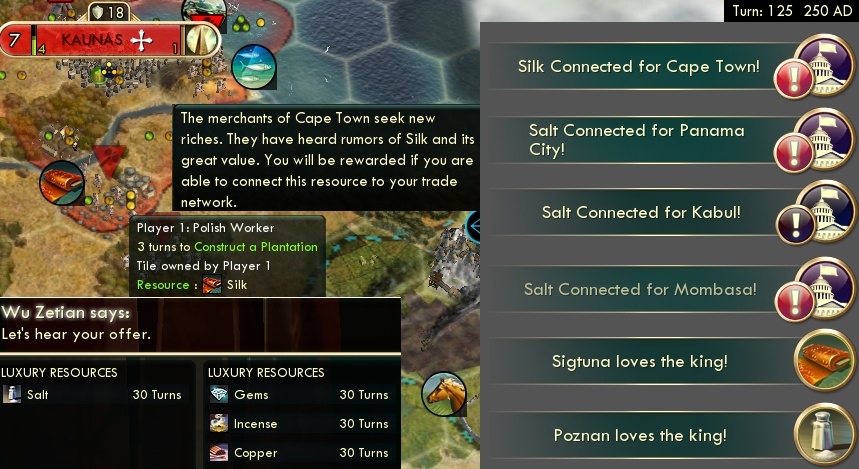
Keep pleasing the city states. Cape Town issued a super convenient quest for silk right as I was already improving it. And I overpaid for China's only salt with three surplus luxuries in order to trigger three more quests. (Nobody had money to buy my luxuries, so this was the way to get some value out of them.) Also two King Days out of it.

And I built Hagia Sophia in a side city with some production to spare (had finished up through its workshop and market), mostly just because two city-states wanted it. And on the very turn I finished it, Florence suddenly quested for a great prophet and recognized the free one immediately. Sure, Civ 5 is a game about letting stuff happen to you. But hey, let the good times roll.
Now came the one big point of challenge in a game without Jesuit Education, getting the public schools built or bought. I didn't have nearly enough money yet for them.
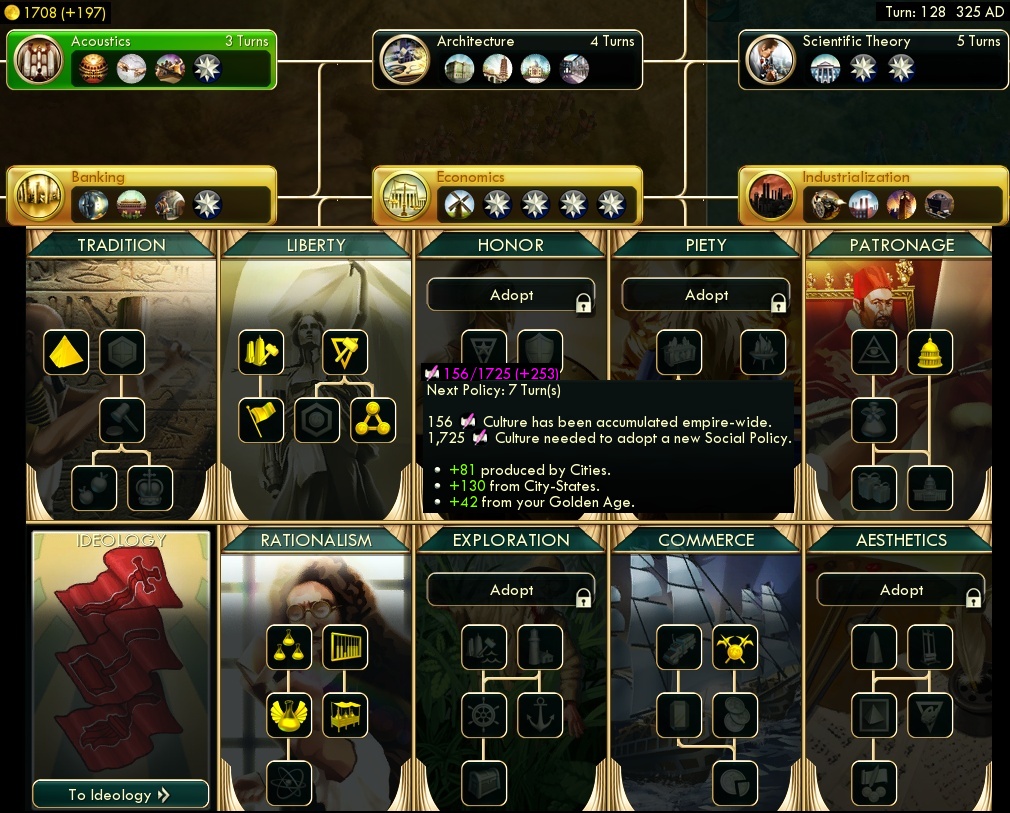
For the first time in a long while, I went for Industrialization before Scientific Theory. This is more attractive when you didn't enter the Renaissance at Acoustics, because Industrialization is only one tech past Economics (which is a prerequisite for either) but Sci Theory takes three. This was the right way to fit together a number of concerns. Industrialization enables Big Ben for the buying discount, which I could start now and complete just as we reach Sci Theory. The four turns spent researching Industrialization also meant simply accumulating four more turns worth of money before schools. Industrialization kicks in the industrial-era value for cultured city-states sooner. Which in turn means that instead of Mercantilism as the industrial age freebie as I had planned, I could take Sovereignty instead in this slot for more gold in the meantime and pick up Mercantilism next still before we reach Sci Theory.

All those threads weaved together exactly as planned. Sci Theory came in on turn 136 timed perfectly with Big Ben and a turn after Mercantilism. 3600 gold in the treasury is enough to buy six schools at 550 cost right away, and the income is enough to finish the rest soon. Sci Theory on t136 merely ties my speed record, rather than being 7 turns ahead as at Printing Press, but that was because I didn't spend a scientist bulb towards Sci Theory as I usually do.
There's something else important going on here: three factories. For the first time in a long while, I got the ideology with factories instead of going to the modern era. I luckily had coal pre-mined (though was prepared to use the Hagia Sophia prophet to connect it immediately if needed.) I had exactly three cities that wanted to build factories anyway, so it was perfect to take advantage of the ideology that way.
Why did Poznan want a factory? I was grooming this as my second-best production city, in preparation to build the Apollo Program in parallel with the capital building Hubble. I've learned that's an important late-game bottleneck to alleviate, and the planning for it starts now. I sent Poznan a food caravan to get it up to size, then multiple production caravans once within 30 turns of Rocketry.
The three factory cities would go on to build their schools rather than buy. Building in Poznan and Gdansk would be about three turns slower than buying the last two schools, but we needed to save money where possible for research labs and spaceship parts.
So I got the ideology on turn 139, another speed record by a long shot, I think my fastest to doing it by Radio at the modern era was t150. Civil Society that early made a noticeable difference and Avant Garde (+25% GPP) saved two turns on the last scientist. Followed up with Universal Suffrage as the next policy of course, on t144, right as the second Great Artist spawned for that extended Golden Age.
Presently it was time to start switching all the tile improvements over to trading posts for the money and Free Thought beaker. I think I actually started this a bit late; with everything running about 7 turns ahead of my previous records, that applied to this too. But I had a lot of workers (18 total), had been aggressive about keeping scavenged ones from barbarian camps nearby, since the city-states already had enough influence for the rest of the game.
I wanted to spend the scientist not bulbed toward Sci Theory towards Plastics instead, but that didn't work. I normally spend two bulbs between Sci Theory and Plastics... and a third doesn't fit. It would have to occur less than 8 turns after schools (if you wait 8 turns after schools, you're within two bulbs of Plastics anyway) for less than maximum value, and also I would hardly have saved up any more money yet after schools to buy labs.
So it went like this. Turn 147 bulb Steam Power, overflow to Rep Parts (and timed right after Warsaw built its hydro plant to start Statue of Liberty.) Turn 148 bulb Radio and overflow to Plastics, reaching it on turn 149. Now nine turns better than my previous best, and with one more scientist still in my pocket.
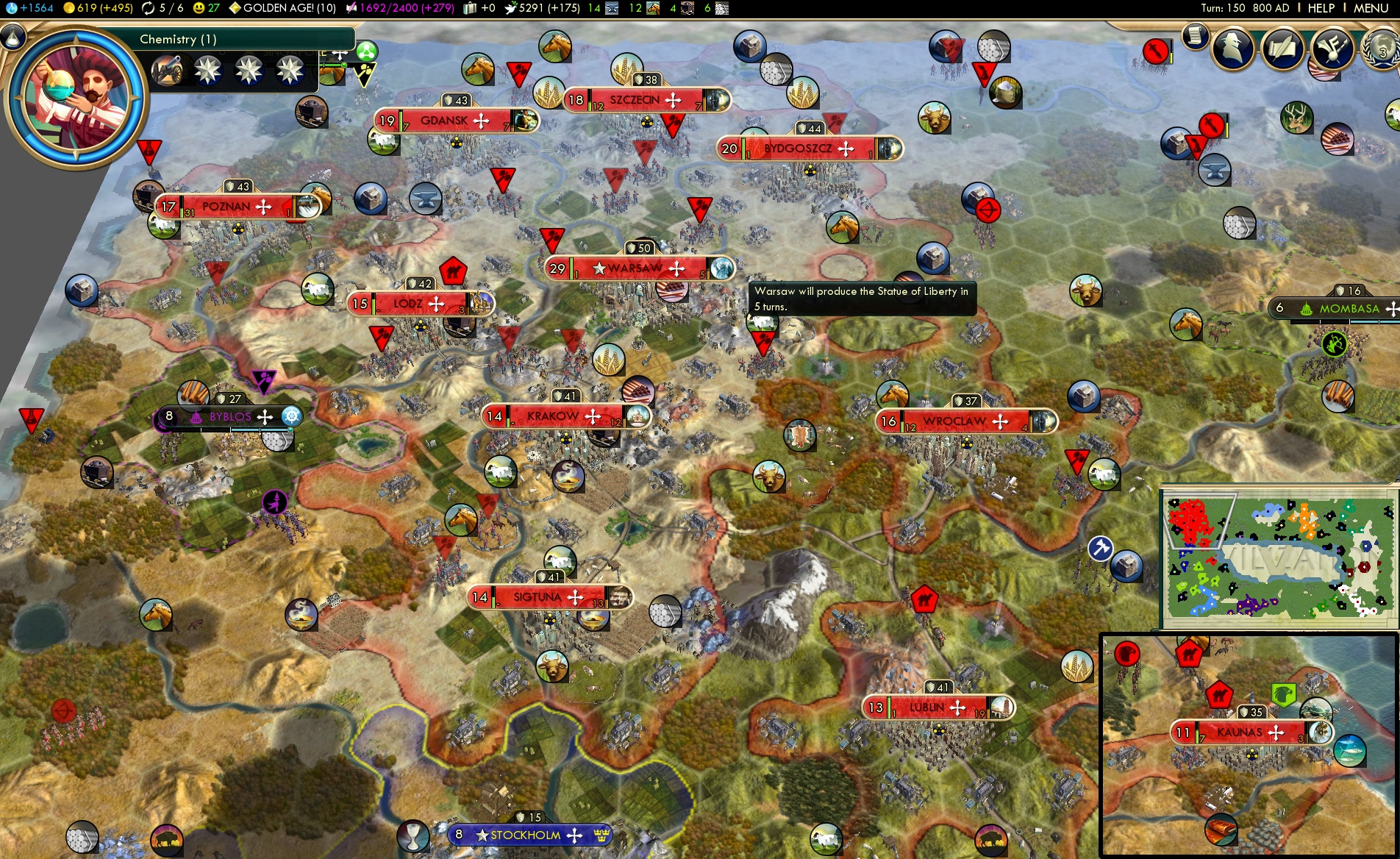
Turn 150 overview, and still smashing records. 186 population is still riding 30 above my previous fastest finish. And 1560 beakers obliterates my previous high of 1090 at this date, thanks to already having bought half the research labs.
Poland wasn't done in the policy department either. I actually had a surplus of policies to spend around now. Compared to my previous game, the five Jesuit policies were really only displaced to two in Tradition. Now the two games were equivalent on each other tree: Liberty up to Meritocracy, Patronage to Consulates, Commerce to Mercantilism, Rationalism to Sovereignty. But now this game had more policies to spend since it had done all those sooner rather than backfilling after Piety.
That surplus went back into Patronage. With the modern era freebie on t148 and the next regular pick on t153, I took Philanthropy and Scholasticism. The first was blank but Scholasticism added a respectable 70 beakers per turn, more than I could get out of any other two policy investments. Then I calculated ahead to find that I would still have one more policy to spare before the required endgame pieces, so the Statue of Liberty policy on t155 could take Wagon Trains.
To recap the entire policy history in yet another nifty visual format:
| Number | Turn | Liberty | Patronage | Tradition | Commerce | Rationalism | Freedom |
|---|---|---|---|---|---|---|---|
| 1 | 6 | Liberty | |||||
| 2 | 20 | Republic | |||||
| 3 | 26 | Collective Rule | |||||
| 4 | 45 | Citizenship | |||||
| Classical | 59 | Patronage | |||||
| 5 | 65 | Consulates | |||||
| 6 | 82 | Tradition | |||||
| Medieval | 83 | Aristocracy | |||||
| 7 | 89 | Meritocracy | |||||
| 8 | 96 | Commerce | |||||
| 9 | 103 | Landsknechts | |||||
| Renaissance | 116 | Rationalism | |||||
| 10 | 116 | Secularism | |||||
| Oracle | 116 | Humanism | |||||
| 11 | 128 | Free Thought | |||||
| Industrial | 128 | Sovereignty | |||||
| 12 | 135 | Mercantilism | |||||
| Free tenet | 139 | Avant Garde | |||||
| Free tenet | 139 | Civil Society | |||||
| 13 | 144 | Universal Suffrage | |||||
| Modern | 148 | Philanthropy | |||||
| 14 | 153 | Scholasticism | |||||
| Statue of Liberty | 155 | Wagon Trains | |||||
| Atomic | 156 | Finisher | |||||
| Information | 156 | Capitalism | |||||
| 15 (writer) | 156 | Volunteer Army | |||||
| 16 (writer) | 162 | Space Procurements | |||||
| 17 (writer) | 162 | Finisher |
Back to tech. Now it was time to bulb up to Rocketry, and now I would take advantage of having one more scientist in my pocket saved from before Sci Theory.
- Turn 152 bulb 9800 beakers on Military Science, overflow to Dynamite
- T153 overflow to Railroad
- T154 bulb 10800 on Flight, overflow to Electronics
- T155 bulb 11300 on Ballistics, overflow to Radar
- T156 execute Poland's usual lategame big combo turn. Perfectly timed on spawning a scientist just now (no more on hand) to bulb for 11800 for Rocketry. Use Poland's atomic era freebie for the Rationalism finisher. Use the Rationalism finisher for Satellites. Use Poland's information era freebie for Capitalism in the ideology. Also spend one Great Writer to get to Volunteer Army.
Rocketry on turn 156 is ten turns faster than any other game I've managed!
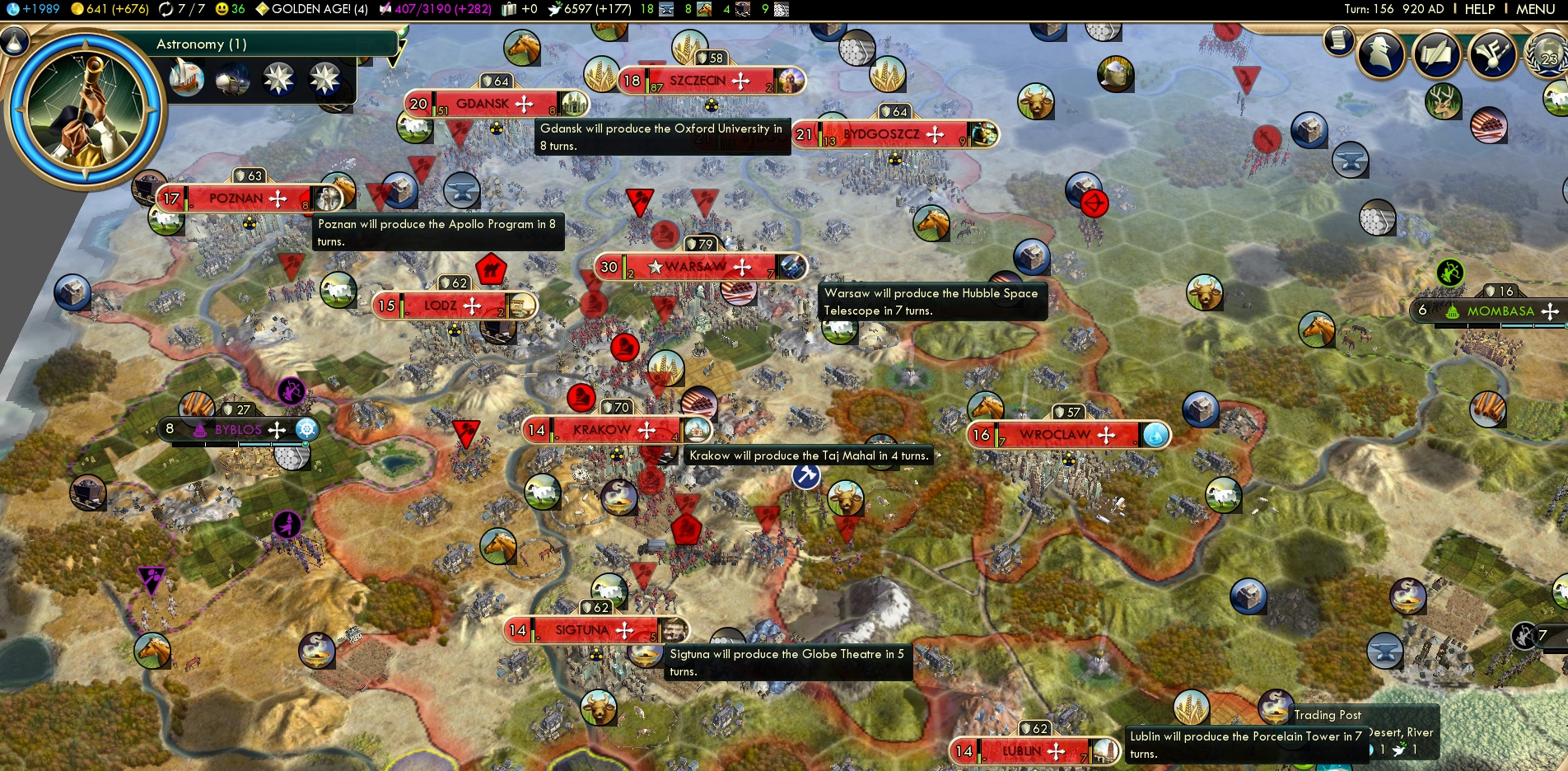
Here's all the endgame pieces coming together, Apollo and Hubble and everything else in parallel. We'll complete all those wonders at basically the same time, and then it will take a few turns to convert the overflow from scientists into techs at the end of each turn. As usual, the priority now is to make sure I research a tech at the end of every turn without skipping any, starting with Astronomy here and continuing through four consecutive cheap techs up on the top row. Also soon after this, I got the third regular Great Writer plus the one from the Globe Theater, which would finish off Liberty and Space Procurements.
The one thing missing is gold to buy the spaceship parts. With Big Ben and Mercantilism, the entire spaceship costs 11000. But my treasury is still empty after just now finishing buying the research labs.
Time to apply every trick I can for gold. Wagon Trains is one. I built the Colossus in my one coastal city (offscreen here) to use the cargo ship for a gold route. I sold aqueducts in cities that would never grow again, and gardens in each city that had spawned its great scientist. Also kept in mind to sell my research labs on the last turn if necessary.
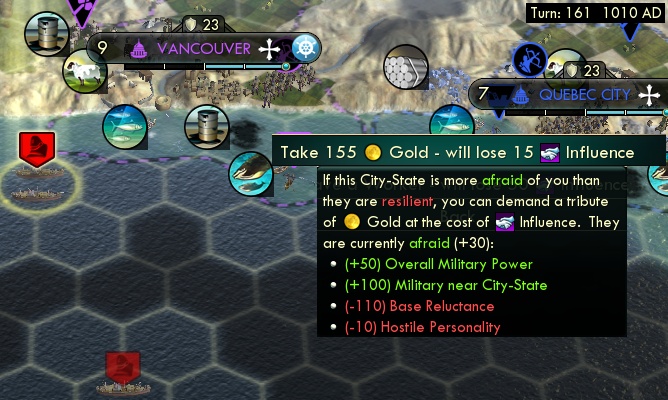
But the big piece would be the Volunteer Army tenet in Freedom to go extract tribute from city-states. One Foreign Legion unit at 42 strength wasn't always quite enough, but two together worked. It took a few turns for them to walk down to the sea and embark, but then they gobbled up tribute from 10 city-states for 1500 total gold.
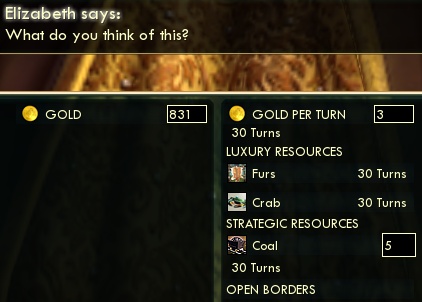
Also I got lucky that England friended me with an inexplicably large treasury of 800 gold that I then acquired.
Back to tech, I'm pretty sure that it's best to use the Rationalism finisher for Satellites. It's worth a bit less than if you wait for a last-column tech. But the problem is that the Rationalism finisher is required to unlock faith-buying scientists. It's too much of a glut if you wait on Rationalism and then get the faith and Hubble scientists all at the same time; it takes several end-turn cycles to consume all their overflow and you end up overshooting the last techs. It's smoother to take the faith scientists a few turns sooner and bulb them up towards Nanotechnology while building Hubble in parallel.
I calculated ahead on the cost of the tech tree and saw I could reach the end after only seven regularly-spawned scientists (including the Leaning Tower in this, because it bumps the cost counter.) The last came at 700 GPP on just turn 160. Then add seven more scientists from the Liberty finisher, Porcelain Tower, Hubble, and three from faith. So here we go:
- Turn 156 to t159 do one-turn research on Astronomy, Navigation, Archaeology, Biology
- t160 bulb last naturally spawned scientist for 13500 on Combustion, overflow to Combined Arms
- t161 overflow to Refrigeration
- t162 bulb two faith scientists directly for Computers and Robotics, overflow to Atomic Theory
- t163 build Oxford for Nanotechnology, bulb third faith and Porcelain Tower scientists for 14200 on Nuclear Fission, Adv Ballistics, overflow to Penicillin
- t164 bulb Liberty finisher and two Hubble scientists directly for 14300 on Ecology, Telecommunications, Mobile Tactics.
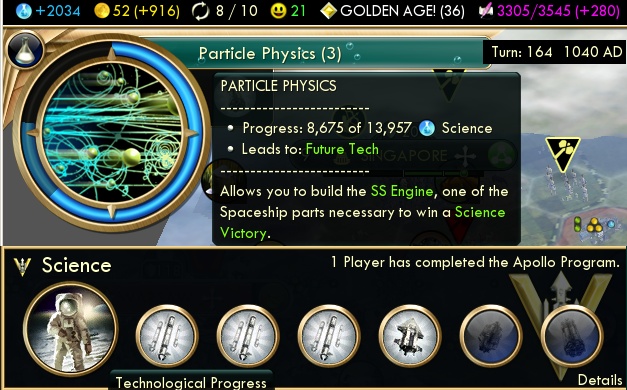
All the scientists finished 3 turns short of Particle Physics, which is OK. That means I did it correctly; waiting for one more naturally spawned scientist would have been 4 more turns instead and would have overshot. On the penultimate turn, I was 950 beakers short, which I could have made up by starting the bulb chain to Rocketry one turn later for more scientist yield (that was less than 8 turns after some of the labs.) But anyway I needed that third turn here for money. I've already bought 4 spaceship parts, but now needed three more turns worth of income plus selling the research labs to afford the last two. So overall I probably could have shaved off one turn with a combination of bulbing to Rocketry one turn later, selling just enough labs one turn sooner, and then some of the schools too on the last turn. But this is good enough.

I finished Particle Physics on turn 167, bought the last spaceship part, and won on turn 168. Eight turns better than my last game.
Wow. This game just smashed all my previous records. That's the magnum opus I was looking for. So what happened here?
I got seven to ten turns ahead of my benchmark pace in every area. It's happened in many of the games that one or a few areas goes better than usual, but to accelerate the finish date requires getting ahead in every area. This game had that. The capital's build queue accelerated that much by working hammers after growth from ruins, by skipping a worker build before settlers, and by skipping one settler thanks to the AI-ceded city. Tech got seven turns ahead to Civil Service and Engineering and Education thanks to the Great Library, and stayed ahead thanks to the high population. Growth in cities beyond the capital got ahead from so many early maritime allies. Happiness got ahead of schedule early (before pagodas) thanks to the two early mercantile allies and stayed ahead thanks to Aristocracy. The time span to spawn Great Scientists is the most incompressible factor, but even that got ahead to a decent degree by reaching Humanism, the World Congress's Sciences Funding, and the Avant Garde tenet all also 7-10 turns sooner than previously. And I saved four turns of waiting for another scientist to spawn thanks to the third one from faith, which Jesuit games don't get. Finally, the midgame build order to aqueducts and universities got ahead by skipping the shrine and temple needed for Jesuit Education.
That last is what I'd never properly accounted for in the Jesuit games. The shrines and temples are necessary but really do set back the cities' build queues. That delays aqueducts and libraries, and ultimately loses the turn advantage that faith-buying gains. It looks great for a Piety - Jesuit Education plan to use 70 base hammers worth of the shrine and temple to pay for 160 hammers of university. Except where that plan fails is in delaying other items. If the watermill gets pushed back 10 turns by the shrine and temple, that's 30 factors of production lost just by the watermill coming later. If the aqueduct is delayed by one growth cycle, that misses out on retention of ~40 food. Add up all that time-valued opportunity cost and Jesuit Education costs as much production as just building the universities. Put another way: Building shrines and temples is bad because they delay growth-related items. Building universities is not bad because growth items are done by then.
So the Liberty - Patronage game plan does seem like the strongest overall, better than Jesuit Education. Consulates makes for unmatchable snowballing if you start-scum to arrange the roster of city-states, enough to outweigh Jesuit Education's later turn savings. Frontloading also matters on Citizenship and Meritocracy and Aristocracy early rather than waiting until after Piety to backfill all of them. As good as Jesuit Education is, five policies spent into Piety is an enormous cost, and can get more benefit in other areas. One of those benefits is the Liberty finisher scientist, which no non-Poland civ can reach after going Jesuit, but alone saves four endgame turns compared to waiting for one more naturally spawned scientist.
I'm still thinking if any other civ can match this result, but concluding that it's not so. Poland gets many advantages but two are particularly critical and unmatchable, one related to timing and one to sheer quantity of policies. The first is that Poland's classical era freebie accelerates Consulates 15 turns ahead of when anyone else can get it, which matters a lot for the influence to start ticking up just before you start clearing lots of camps for the city-states. And the other is Mercantilism, which Poland can reach perfectly on schedule to discount the schools, but nobody else can get there at all without sacrificing Patronage entirely or a big chunk of Liberty.
Buying those schools and labs is the big problem for any other civ without Jesuit Ed and unable to reach Mercantilism. Poland barely had enough money even with Mercantilism and I don't see how anyone else could overcome its absence. Any path to Mercantilism would give up a lot of frontloading in Patronage and Liberty. Simply slowbuilding the schools might be tenable, but not the labs since the timeframe then is so short from Plastics to Rocketry to the end. A workaround could be Order instead of Freedom, for the Skyscrapers discount on schools and labs and not buying spaceship parts at all, but then Order demands hills to build the SS parts and you can't get enough without the Tradition opener.
I could rest here and close the books on Civ 5, or take up the "challenge accepted" mantle one more time. Not sure which right now, but I'll follow any discussion at Realms Beyond.